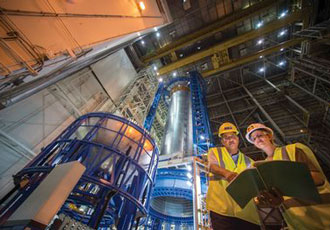The future of engineering demands diversity

There are current changes taking place in the science and technology landscape that are like nothing we have ever seen before; or actually, that we have seen since the industrial revolution over 200 years ago. With International Women in Engineering Day taking place last week, Steven Gillard, Head of Government Affairs at Boeing UK & Ireland talks about the future of diversity in engineering.
The world now spends over $1 trillion on research and development in a range of engineering-related disciplines – anything from robots to social media - and the number of people working in technology-related research now stands at well over 5 million in the UK. This accounts for around a quarter of UK turnover, according to Engineering UK 2016. Globally, countries such as China, India and Brazil have registered unprecedented trajectories into the technology market in the last fifteen years, and are poised to take advantage of new opportunities as soon as they come.
The pace of change is rapid, with self-driving cars and VR technology only a few years away from entering the global market on a mass scale. The iPhone, an item now as ubiquitous as wallets and car keys, is only nine years old.
With such game-changing disruption taking place, the engineering industry must change radically to keep up, and businesses must adapt or die.
The big question, therefore, is, how can engineering firms become successful disruptors against this backdrop of change, and avoid being disrupted out of existence themselves?
There are three markers of success here: Strong skills in science, technology, engineering and mathematics (STEM); unrivalled creativity; and broad diversity.
First, a population with a solid grounding in STEM education and skills is essential. Enabling boys and girls of all ages to pursue an education in science & technology, and providing them with the infrastructure to gain the required training and qualifications - as well as the places to work later in life – is vital in providing fertile ground for innovation.
But more than this, businesses should be prepared to shift the expectations of what makes the engineering sector successful, and harness creative skills in parallel with technical ones. The UK is well placed to change the paradigm in this way. It is hard to imagine another country that could produce both the creativity behind Monty Python, and one of the most technically sophisticated and successful engineering sectors in the world, delivering highly advanced civil and military aircraft around the globe. The UK is renowned for its technical capabilities, education and infrastructure, as well as its un-matched creativity in other areas. Combining these forces more effectively in engineering should not, therefore, be an insurmountable leap to make.
In parallel, the engineering sector must become more diverse. There is an urgent need for diversity in engineering, and thus the creation of a culture that embraces new ideas and is more prepared to innovate. Innovative breakthroughs have always come from those who have thought differently to the mainstream – Frank Whittle, the inventor of the turbojet engine, is a great example of this. Engineering businesses should be more attune to the fact, and hire talent wherever it comes from and no matter how old it is, whether it is women, ethnic minorities, those from other industries, or academics.
Thinking laterally in this way to create the widest possible talent pool, and championing those with different ideas, will mark out those who are able to challenge the status quo and create environments that support diversity, and in which people embrace change. People think differently for a variety of reasons, whether it is culture, education or life experience; whilst gender and other traditional diversity streams inevitably impact an individual’s life experiences as well. Creativity, too, comes from harnessing different perspectives, which are shaped by culture, background, education and profession. If people accept this premise, putting in place the steps to ensure their business is truly diverse is not just a moral imperative, but an absolute business necessity.
Diversity and inclusion sit at the core of Boeing's values. Having diverse employees, business partners and community relationships is essential to us being able to create advanced aerospace products and services for our diverse customers around the world, and will help us adapt to the challenges of the future. Boeing also has an active recruitment programme to identify and attract talent through university recruiting, as well as targeted diversity and professional recruiting.
But this must go further, and should be applied right across the engineering industry. Companies need to collaborate with universities to engage with the hardest to reach demographics and promote them throughout their educational life, proactively creating a level playing field and cultures of inclusiveness. It is the responsibility of every middle manager up to the CEO to promote inclusiveness and recruit accordingly, rather than in the image of themselves.
Rigorously recruiting the best minds from everywhere includes, without a doubt, the massively under-tapped female talent pool. According to the Women’s Engineering Society, only 9% of the engineering workforce is female, while research shows that 64% of all engineering employers say there is a shortage of engineers. It is not hard to imagine what could be achieved if this talent shortfall was unlocked, not only in terms of growth but also in terms of new ideas brought to the table.
Engineering is being confronted by unprecedented change. The challenge is real and pressing, but the routes to success are simple. STEM education, open recruitment processes, and the fostering of cultures that embrace innovation will all shore up the future of the UK’s engineering sector. Millions of young women and girls who have yet to discover their passion for engineering hold the keys to that future, and they must be enabled to realise it.
Blog piece courtesy of INWED17.
Similar articles
More from Electronic Specifier
- Building the case for construction offices in 2021 20th May 2021
- UK construction: is the industry finally on the up? 26th August 2020
- Speaking to a younger generation of women in tech 11th August 2020
- Engineering firms encouraged to get ‘2020’ vision 6th January 2020












Write a comment
No comments